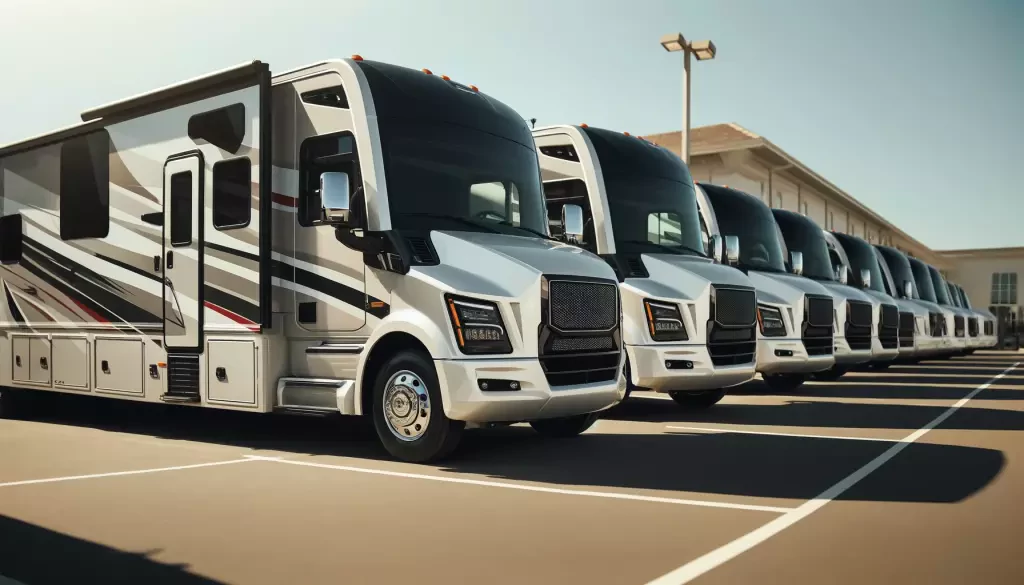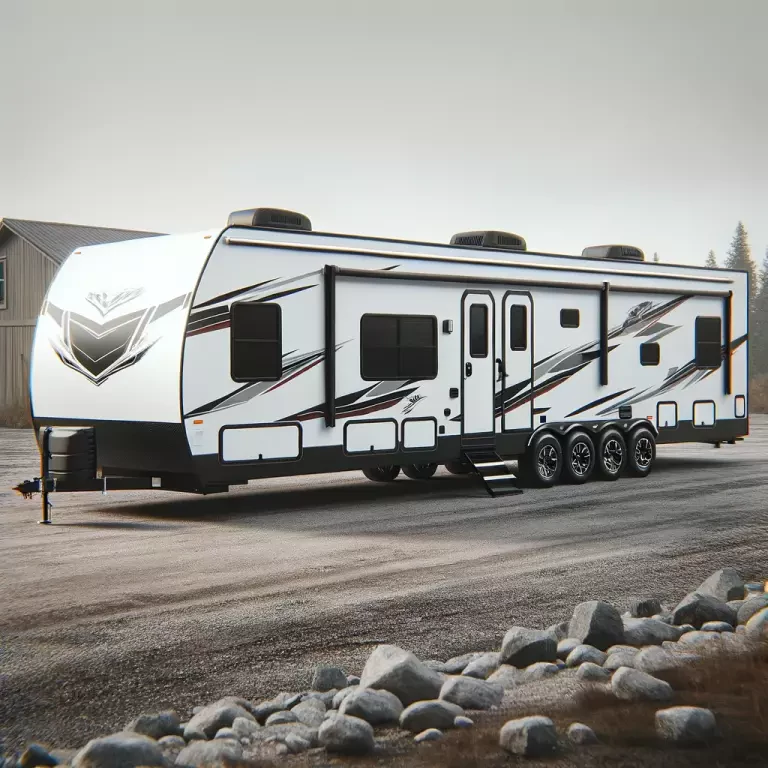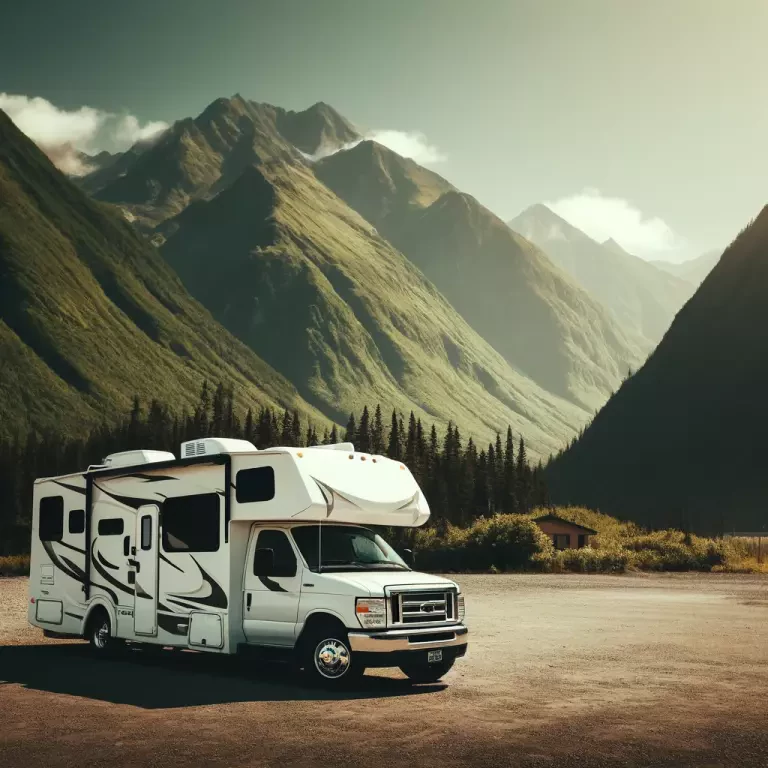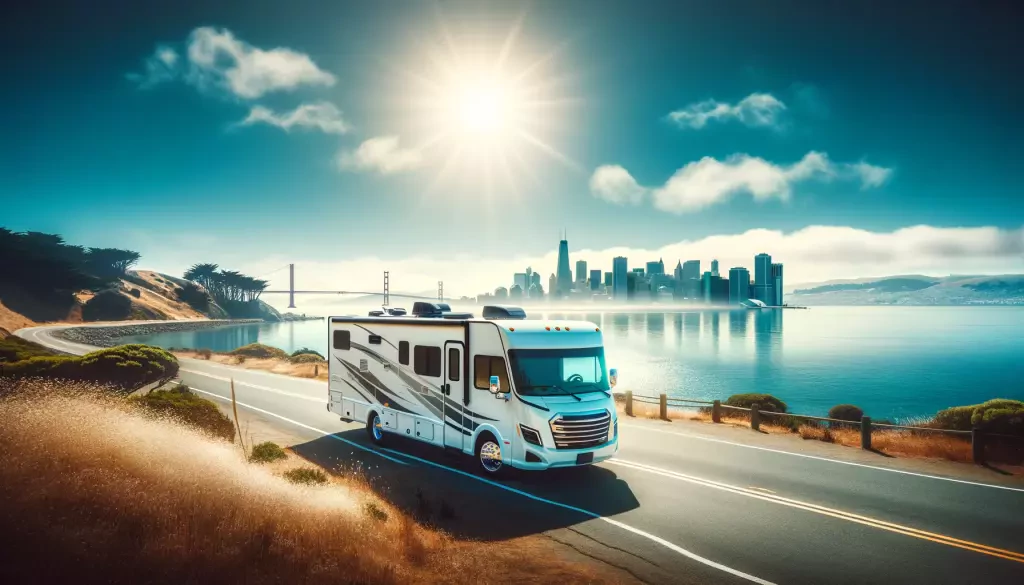
When it comes to RV transport, selecting the right vehicle is crucial for ensuring a safe and efficient move. Various types of vehicles are designed specifically to handle the unique challenges presented by different kinds of RVs. Understanding these options can help you make an informed decision that best suits your RV’s needs.
Types of RVs and Their Transport Needs
Recreational vehicles (RVs) come in various forms, each with specific transport needs. Class A motorhomes are the largest, offering spacious living areas and luxury amenities, and require heavy-duty tow vehicles or flatbed trucks. Class B motorhomes, or camper vans, are smaller and can be transported using standard tow vehicles or enclosed trailers. Class C motorhomes, mid-sized, often need vehicles with a high maximum tow rating. Fifth-wheel trailers and travel trailers are popular for their detachable nature, allowing towing by heavy-duty pickup trucks with sufficient towing capacity. Toy haulers, designed to transport recreational toys, also require high towing capacities.
- Class A Motorhomes: Large, luxurious, require heavy-duty tow vehicles or flatbed trucks.
- Class B Motorhomes: Smaller, transportable with standard tow vehicles or enclosed trailers.
- Class C Motorhomes: Mid-sized, need high maximum tow rating vehicles.
- Fifth-Wheel Trailers: Towed by heavy-duty pickup trucks with special hitches.
- Travel Trailers: Towed using conventional hitches, varying in size and weight.
- Toy Haulers: Require high towing capacities for transporting recreational toys.

Flatbed Trucks for RV Transport
Flatbed trucks are commonly used for RV transport due to their versatility and capacity, featuring a flat, open bed that can accommodate various RV sizes and shapes. They are particularly useful for transporting large Class A motorhomes, which are too big for standard tow vehicles, and offer easy loading and unloading for short-distance RV shipping where overhead clearance is not an issue. Flatbed trucks provide a stable and secure platform, handling heavy and bulky RVs with high maximum tow ratings.
- Versatility and Capacity: Can accommodate various RV sizes and shapes.
- Class A Motorhomes: Ideal for large motorhomes too big for standard tow vehicles.
- Easy Loading/Unloading: Suitable for short-distance shipping.
- Stable and Secure: Provides a robust construction for heavy-duty transport tasks.
Enclosed Trailers for RV Transport
Enclosed trailers offer added protection for RVs during transport, shielding them from weather, debris, and potential damage. They are particularly beneficial for Class B and Class C motorhomes, as well as smaller travel trailers. Enclosed trailers provide enhanced security and are ideal for long-distance RV shipping, ensuring the RV arrives in pristine condition. While the cost may be higher, the investment is worthwhile for valuable or fragile RVs.
- Protection: Shields RVs from weather, debris, and damage.
- Class B and C Motorhomes: Beneficial for these and smaller travel trailers.
- Security: Ideal for long-distance shipping, ensuring pristine arrival.
- Cost: Higher but worthwhile for valuable or fragile RVs.
- Lower Towing Capacities: Suitable for RVs with lower towing capacities, ensuring safe transport.
Towing Vehicles for RV Transport
Towing vehicles are essential for transporting many types of RVs, especially travel trailers and fifth-wheel trailers. These vehicles must have a high tow rating to handle the weight and size of the RV safely. Tow dollies, which lift the front wheels off the ground, and flat towing, where all wheels remain on the road, are common methods. Both methods have their advantages, depending on the specific RV type and owner preference.
- Tow Dollies: Lift the front wheels off the ground.
- Flat Towing: Keeps all wheels on the road.
- High Tow Rating: Necessary for safely handling RV weight.
- Travel Trailers: Often transported using towing vehicles.
- Fifth-Wheel Trailers: Require specialized towing equipment.
- Owner Preference: Choice depends on RV type and personal needs.

Heavy-Duty Trucks for Large RVs
Heavy-duty trucks are a must for motorhome shipping, especially for large or heavy RVs like Class A motorhomes and oversized fifth-wheel trailers. These trucks have the power and tow rating needed to transport substantial loads safely. With advanced braking systems and enhanced suspension, heavy-duty trucks ensure a smooth ride, protecting the recreational vehicle during the journey. They are perfect for long-distance trips or when moving to a new camping spot.
- Motorhome Shipping: Ideal for large or heavy RVs.
- Power and Tow Rating: Necessary for substantial loads.
- Advanced Braking Systems: Enhance safety during transport.
- Enhanced Suspension: Ensures a smooth ride.
- Long-Distance Trips: Suitable for extended journeys or moving camping spots.
- Heavy RVs: Designed for Class A motorhomes and oversized fifth-wheel trailers.
Specialized Trailers for Unique RVs
Specialized trailers are crucial for transporting unique or unusually shaped RVs. Lowboy trailers, with their lower deck height, are perfect for tall RVs, ensuring they can pass under bridges and overpasses. Gooseneck trailers, which attach to a ball hitch in a truck bed, offer superior stability and weight distribution for large RVs. These trailers are essential for RV owners needing specialized motorhome shipping solutions provided by a reliable shipping company.
- Lowboy Trailers: Lower deck height for tall RVs.
- Gooseneck Trailers: Attach to a ball hitch in a truck bed.
- Superior Stability: Important for large RVs.
- Weight Distribution: Ensures safe and secure transport.
- Specialized Shipping: Essential for unique or unusually shaped RVs.
- Reliable Shipping Company: Provides necessary motorhome shipping solutions.
Understanding these transport options helps RV owners choose the right method to move their recreational vehicle safely and efficiently, ensuring a hassle-free camping trip.
Multi-Vehicle Transport Options
Transporting multiple RVs simultaneously can be efficient and cost-effective, especially for RV dealers and manufacturers. This method involves using large trucks or specialized trailers designed to carry several RVs at once. It’s a common practice for moving inventory to different locations or dealerships. For individual RV owners, multi-vehicle transport can be a way to save on costs by sharing a load with others. This approach ensures that various types of RVs, from travel trailers to fifth wheels, are transported safely and efficiently. It reduces the overall cost per unit, making it an attractive option for those looking to move multiple recreational vehicles.
- Efficiency: Transports several RVs simultaneously.
- Cost-Effective: Lowers overall transport costs by sharing loads.
- Large Trucks: Designed to carry multiple RVs.
- Specialized Trailers: Used for multi-vehicle transport.
- Dealer Use: Ideal for dealerships and manufacturers.
- Individual Savings: Owners can share costs with others.
- Safe and Efficient: Ensures the secure transport of multiple RVs.

Safety and Security Measures in RV Transport Vehicles
Safety is paramount in RV transport, and the vehicles used are equipped with various features to ensure the RV's protection during transit. Flatbed trailers and enclosed trailers often have secure tie-down points and stabilizing equipment to keep the RV stationary. Advanced braking systems and suspension in heavy-duty trucks provide a smooth ride, reducing the risk of damage to the RV’s slide-outs and other sensitive parts. Four-wheel-drive vehicles are sometimes used to navigate challenging terrains during transport, ensuring the RV reaches its destination without incident.
Additionally, RV transport companies implement strict safety protocols, including regular vehicle inspections and secure loading practices. These measures help protect the RV, whether it’s a travel trailer or a fifth wheel, ensuring it arrives safely for family vacations or after buying a new RV.
- Secure Tie-Down Points: Keeps the RV stationary during transport.
- Advanced Braking Systems: Ensures a smooth and safe ride.
- Suspension Systems: Protects sensitive parts like slide-outs.
- Four-Wheel Drive: Used for navigating challenging terrains.
- Safety Protocols: Regular inspections and secure loading practices.
- Variety of RVs: Suitable for travel trailers, fifth wheels, and more.
- Family Vacations: Ensures RVs arrive safely for use.
- New Purchases: Safely transports newly bought RVs.
Choosing the Right Vehicle for Your RV
Selecting the appropriate transport vehicle for your RV is crucial for ensuring a safe and efficient move. Start by considering the size and weight of your RV. Larger motorhomes and fifth wheels require heavy-duty trucks or flatbed trailers, while smaller travel trailers might be safely transported using tow vehicles with high tow ratings. The distance of the transport is also important; for long distances, enclosed trailers offer additional protection. Additionally, think about any special features of your RV, like slide-outs, which may need extra care.
Working with a professional transport company, like A1 Auto Transport, is essential. Professionals have the expertise and equipment to handle various types of RVs, ensuring that your recreational vehicle arrives safely at its destination.

Conclusion
Choosing the right vehicle for RV transport is vital for ensuring the safety and security of your RV. By understanding the different transport options and considering factors like size, weight, and distance, you can make an informed decision. Working with a professional transport company like A1 Auto Transport can provide peace of mind and ensure a smooth transport process. Contact A1 Auto Transport for reliable and expert RV transport services.
For safe, reliable RV transport, trust the experts at A1 Auto Transport. Whether you have a motorhome, travel trailer, or fifth wheel, we have the right solution for you. Contact us today to get a free quote and ensure your RV reaches its destination securely.






 Share on Facebook
Share on Facebook Share on LinkedIn
Share on LinkedIn Share on Twitter
Share on Twitter




 Google
Google  Instagram
Instagram  Trustpilot
Trustpilot 



